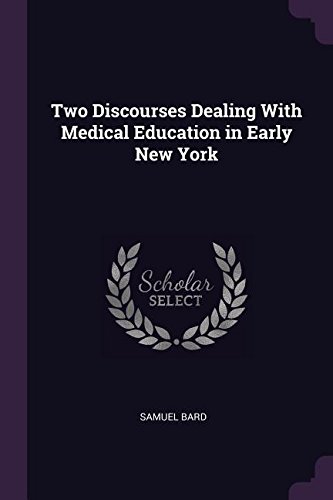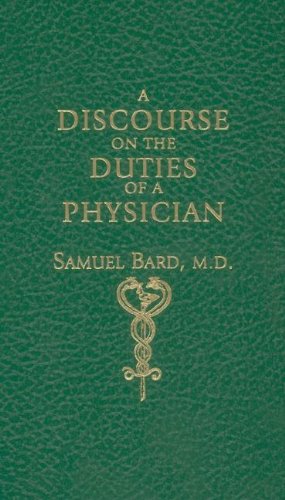Background
He was born in Philadelphia, where his father John Bard was practising medicine. His mother had been a Miss Valleau, niece of Dr. John Kearsly, an English surgeon of that town.


( This work has been selected by scholars as being cultur...)
This work has been selected by scholars as being culturally important, and is part of the knowledge base of civilization as we know it. This work was reproduced from the original artifact, and remains as true to the original work as possible. Therefore, you will see the original copyright references, library stamps (as most of these works have been housed in our most important libraries around the world), and other notations in the work. This work is in the public domain in the United States of America, and possibly other nations. Within the United States, you may freely copy and distribute this work, as no entity (individual or corporate) has a copyright on the body of the work. As a reproduction of a historical artifact, this work may contain missing or blurred pages, poor pictures, errant marks, etc. Scholars believe, and we concur, that this work is important enough to be preserved, reproduced, and made generally available to the public. We appreciate your support of the preservation process, and thank you for being an important part of keeping this knowledge alive and relevant.
https://www.amazon.com/Discourses-Dealing-Medical-Education-Early/dp/1377335976?SubscriptionId=AKIAJRRWTH346WSPOAFQ&tag=prabook-20&linkCode=sp1&camp=2025&creative=165953&creativeASIN=1377335976

( This classic essay on the responsibilities of a doctor ...)
This classic essay on the responsibilities of a doctor was first published in New York in 1769. It remains a perfect gift for a young doctor just starting out or for one who is older and wiser. This classic will be an inspiration to any who read its timeless message.
https://www.amazon.com/Discourse-Duties-Physician-Little-Wisdom/dp/1557094462?SubscriptionId=AKIAJRRWTH346WSPOAFQ&tag=prabook-20&linkCode=sp1&camp=2025&creative=165953&creativeASIN=1557094462
He was born in Philadelphia, where his father John Bard was practising medicine. His mother had been a Miss Valleau, niece of Dr. John Kearsly, an English surgeon of that town.
In 1746, John Bard moved to New York, where young Bard was given a grammar school education and entered King's College at the age of fourteen during the presidency of Dr. Samuel Johnson. Destined by his father for the study of medicine, on graduation in 1760 he was sent abroad for that purpose, in spite of the fact that his father's circumstances were not opulent. The ship on which he sailed was captured by a French privateer and taken into Bayonne, where he was thrown into prison. There he stayed five months until released through the good offices of Benjamin Franklin, a friend of his father. He went at once to London and through the intercession of Dr. John Fothergill, another of his father's friends, was admitted as an assistant at St. Thomas's Hospital. From London he went to Edinburgh, then in the zenith of its glory, where he came under the instruction of Cullen, Whytt, the Monroes and Hope, and acquired a reputation as an industrious student and a good classical scholar. When he took his M. D. in 1765, his inaugural essay was entitled De viribus opii, said to be a well written and timely article; he was also given a prize for the best herbarium of the indigenous vegetables of Scotland, containing specimens of some 500 plants.
On returning to New York, Bard began practise with his father and soon acquired a popularity and a clientage that were quite unusual. He did no surgery, preferring to devote himself exclusively to what is called today "internal medicine. " The question of starting a medical school in New York had been in Bard's mind even before he went abroad. The establishment of the University of Pennsylvania school in Philadelphia by John Morgan, soon after his arrival from foreign studies in 1765, stimulated the New York brethren to renewed attempts to elevate the standard of medicine. Bard took an active part. With Clossy, Jones, Middleton, Smith, and Tennent, the school was opened with Bard professor of the theory and practise of physic; the first degrees being conferred in 1769, Bard delivered an address which was instrumental not only in raising funds for the school, but later in founding the New York Hospital (1791). The school was affiliated with King's College, and Bard was connected with it for forty years, the last twenty as dean of the faculty and trustee.
On the opening of the Revolution, it was not unnatural that Bard's sympathies should be with the mother country since his medical training had been obtained in London and Edinburgh. He deemed it prudent to retire to Shrewsbury, New Jersey, where he engaged unsuccessfully in the manufacture of salt. When the British took possession of New York, he returned to the city. People mistrusted him for his Loyalist leanings, but the mayor of the city, an old friend of Bard's, called him as his private physician, vouched for him to prominent citizens, and thereby restored him to his former extensive practise. By the end of the war he was in comfortable circumstances.
When the American Government was established in New York, Washington selected Bard as his physician. The New York Hospital was opened in 1791 and Bard began his service as visiting physician, devoting much time to obstetrics; in the following year the medical school was united with Columbia College, and he was continued as professor of theory and practise and was appointed dean of the faculty. He helped found the city library and the New York Dispensary. In 1795 he took Dr. David Hosack into partnership and in 1798 retired to Hyde Park. He returned to New York, however, during the latter year to offer his assistance in the yellow-fever epidemic, caught the disease, and henceforth was definitely obliged to give up active practise.
He was elected president of the original College of Physicians and Surgeons in 1811. In Hyde Park he was president of the Agricultural Society of Dutchess County, and a founder of the Protestant Episcopal church there. He lived to the age of seventy-nine, and died from an attack of pleurisy the day after the death of his beloved wife who had had the same disease. f their ten children but three were alive at the time of their parents' passing, with several grandchildren who had been of great solace to their grandparents in their declining years. As regards the writings of Samuel Bard, he published an article in 1771 entitled: An Inquiry into the Nature, Cause and Cure of the Angina Suffocativa, or Sore Throat Distemper, as It Is Commonly Called by the Inhabitants of This City and Colony.
( This work has been selected by scholars as being cultur...)
( This classic essay on the responsibilities of a doctor ...)
He married his cousin, Mary Bard, in 1770, and divided his time between the city and his father's house at Hyde Park, on the Hudson. They had 10 children.
